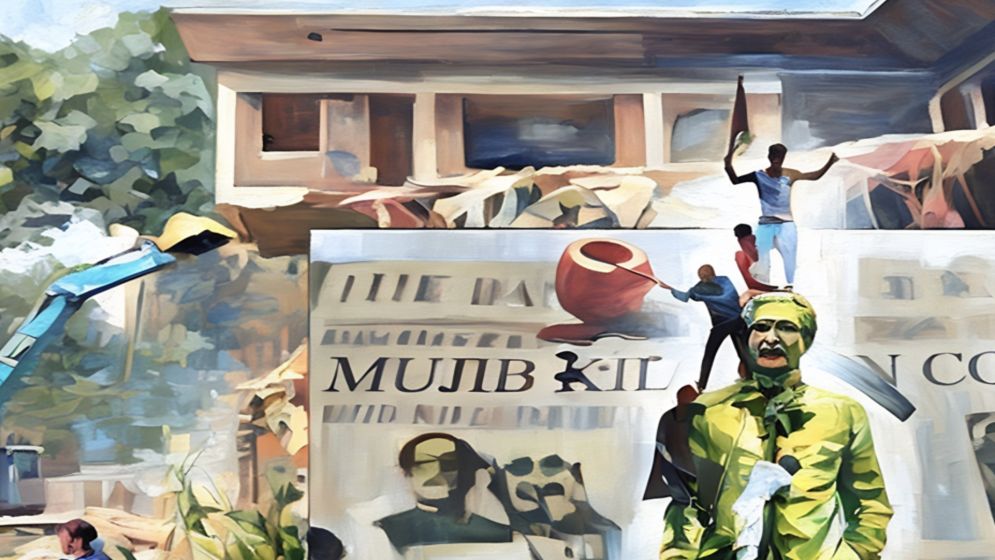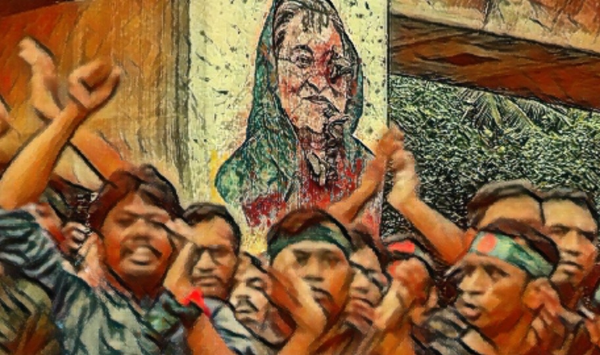To truly move forward, Bangladesh must confront the ‘cult of Bangabandhu’

By any measure, Bangladesh’s biggest political affliction has been the canonization of Sheikh Mujibur Rahman as Bangabandhu, the so-called “Father of the Nation.”
What began as a cultural narrative has ossified into a habit, and like all habits, it has proved nearly impossible to break.
The consequences are corrosive. Mujib has become less a historical figure than a license for plunder. The greatest beneficiaries of this mythmaking were cultural freeloaders–those who discovered that the fastest way to wealth and patronage was through effusive praise of Mujib.
“Glorify Mujib, pocket the cash” became a convenient formula. Over time, Mujib was inflated into a universal symbol for the Awami League, stretching beyond politics into a kind of cultural racket.
Even their grief is self-serving. When they weep, it is not for democracy or for history but for the loss of access to their hustle. Why, then, should sympathy be extended to Mujib?
During Sheikh Hasina’s reign, August 15th, the day of Mujib’s assassination, was treated less as solemn remembrance and more as an occasion for spectacle. Step outside, and the atmosphere often resembled Valentine’s Day, Hindi film songs blaring in public parks.
At its core, the notion of Bangabandhu is a literary nostalgia, a sentimental fiction. It is no more real than a tragic hero in a novel–a “Devdas” whose admirers indulge in performative sorrow.
A serious sense of history should resist such mythologizing. National liberation is never the work of a lone savior. Nations win wars, not individuals. History records collective spirit, not cult figures.
So, what Bangladesh practices is not history but event-worship and anything surrounding Mujib is a grim reminder of that.
The truth is harsher: Mujib throttled democracy the moment he returned.
His experiment with one-party rule under BAKSAL suffocated both democracy and socialism, opening the door to opportunists who plundered the country under the banner of “Mujibism”--or what more accurately resembled Abbatantra, a politics of paternal dictatorship.
Looting, murder, and the violation of women became commonplace under this model.
But what exactly is Mujibism? Ask the younger generation and you’ll find blank stares. Even Awami League loyalists often stumble when pressed for a definition.
To put it bluntly: Mujibism was the deliberate destruction of both democracy and socialism in order to enshrine one man at the center of the state. Mujib is the law, Mujib is the policy. That was the creed.
Its architects were the so-called progressives and leftists who, under the guise of idealism, built an authoritarian cult.
And that cult still lingers. Until Bangladesh confronts the mythology of Mujib, it will remain trapped in the politics of worship rather than the politics of history.

Bangladesh truly needs a post-Mujib
era
“There was nothing mystical about the Superman of history,” Umberto Eco once observed.
In Bangladesh, that simple truth was drowned out by the foolishness of poets and the literary indulgence of the “Dadabadi” tradition–a pro-Indian cultural narrative imported from across the border.
Out of this grew what I have long called a cultural fascism within the Awami League, a politics that elevated Sheikh Mujibur Rahman from a flawed leader into a mythical patriarch.
But the liberation of a nation is never the work of one man. It is the accumulation of countless sacrifices, decisions, and acts of leadership.
Individual worship, however, was fostered by the “Dadas”--figures who confused nostalgia with history. Yet history is not built on worship; it is built on collective spirit.
A nation that deifies the past can never move forward. As Pierre Trudeau wisely put it: “The past is to be respected and acknowledged, but not to be worshiped.”
Bangladesh has yet to absorb this lesson. Mujib has been turned into a fictional construct, a character in a national melodrama. Instead of forging an honest account of our collective struggle, we have been fed decades of “Awami history,” saturated with the sentimental garbage of opportunistic poets.
Nostalgia has become an addiction. People outgrow detective novels when they realize they are fiction, but in politics, many never let go of the thrill. Add personal gain to that thrill, and the habit becomes entrenched.
This is why Bangladesh remains trapped in Mujib-worship. It is mythmaking. It has deprived the country of the ability to create a genuine national history. After 2024, our first national responsibility must be precisely that: to write a history that belongs to the people, not to a party or its patriarch.
The current government, however, seems reluctant to hold the Awami League accountable. Instead, it has left the burden to the people–to keep every faction of the League perpetually on the run.
It is a thankless, exhausting duty. But it is a necessary one. Because only by dismantling the cult and confronting the myth can Bangladesh finally begin to write its own history.
—
Rezaul Karim Rony is a writer and thinker. He is the editor of Joban magazine

